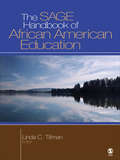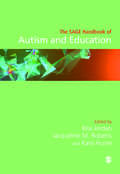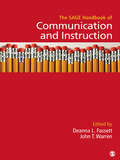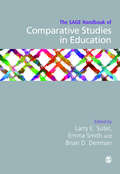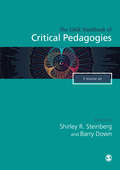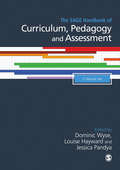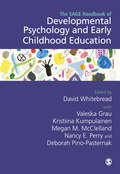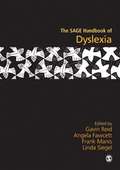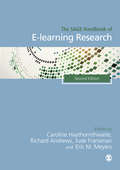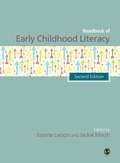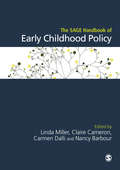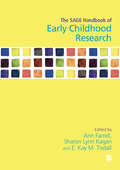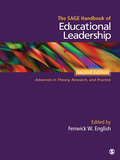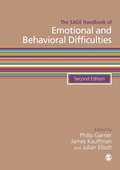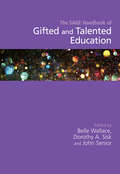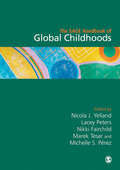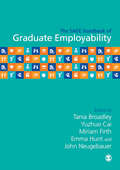- Table View
- List View
The SAGE Handbook of African American Education
by Linda C. TillmanThis Handbook received an honorable mention at the 2009 PROSE Awards. The PROSE Awards annually recognize the very best in professional and scholarly publishing by bringing attention to distinguished books, journals, and electronic content in over 40 categories."This volume fills the tremendous void that currently exists in providing a much-needed lens for cultural leadership and proficiency. The approach provides a wide divergence of perspectives on African American forms of leadership in a variety of diverse leadership settings."—Len Foster, Washington State University The SAGE Handbook of African American Education is a unique, comprehensive collection of theoretical and empirical scholarship in six important areas: historical perspectives, teaching and learning, PK–12 school leadership, higher education, current issues, and education policy. The purpose of the Handbook is to articulate perspectives on issues affecting the participation and leadership of African Americans in PK–12 and postsecondary education. This volume also addresses historical and current issues affecting the education of African Americans and discusses current and future school reform efforts that directly affect this group.Key FeaturesPromotes inquiry and development of questions, ideas, and dialogue about critical practice, theory, and research on African Americans in the United States educational systemMakes significant contributions to the scholarship on African Americans in the broad context of U.S. education and societyAddresses the central question—in what ways do African Americans in corporate, private, and public positions influence and shape educational policy that affects African Americans?"The SAGE Handbook of African American Education is a unique, comprehensive collection of theoretical and empirical scholarship in six important areas: historical perspectives, teaching and learning, Pre-K-12 school leadership, higher education, current issues, and education policy."—TEACHERS OF COLOR"A wise scientist once argued that to doubt everything or to believe everything often results in the same solution set; both eliminate the need for reflection. This handbook provides an intellectual space for those interested in true reflection on the human ecology of the African American experience in schools, communities, and society. The /Handbook of African American Education/ is a repository of information developed to advance the human service professional."—William F. Tate IV, Washington University in St. Louis"This handbook represents the most comprehensive collection of research on African Americans in education to date. Its breadth spans the historical, the political, institutional and community forces that have shaped educational opportunities and attainment among African Americans. The review of extant research on a range of topics from the role of culture and identity in learning, teacher preparation, educational leadership, to higher education and educational policy is far-reaching and cutting edge. This volume has historic significance and will become a classic collection on African American education for scholars and practitioners alike."—Carol D. Lee, Professor, Northwestern UniversityVice-President, Division G, American Educational Research Association"This handbook is needed as a basic reference for professors and graduate students conducting research on the education of Blacks in America."—Frank Brown, University of North Carolina at Chapel Hill
The SAGE Handbook of Autism and Education
by Rita Jordan Jacqueline M. Roberts Kara HumeEducation is an important aspect of the environmental influences on autism and effective education can have a significant effect on outcome for those on the autism spectrum. This handbook is a definitive resource for reflective practitioners and researchers who wish to know and understand current views of the nature of autism and best practice in educational support. It explores the key concepts, debates and research areas in the field.
The SAGE Handbook of Autism and Education
by Rita Jordan Jacqueline M. Roberts Kara HumeEducation is an important aspect of the environmental influences on autism and effective education can have a significant effect on outcome for those on the autism spectrum. This handbook is a definitive resource for reflective practitioners and researchers who wish to know and understand current views of the nature of autism and best practice in educational support. It explores the key concepts, debates and research areas in the field.
The SAGE Handbook of Communication and Instruction
by Dr Deanna L. Fassett Dr John T. WarrenAs the only multi-paradigmatic collection of research in the field, this Handbook brings together a comprehensive range of essays to serve as a fully inclusive resource. Deanna L. Fassett and John T. Warren, along with two section editors and twenty-nine additional contributors, provide a balanced overview of various paradigms in the field—social scientific, interpretive, and critical. Key Features Three sections, addressing overlapping issues in communication and instruction, collectively represent multiple paradigms. This allows the reader to experience the depth and nuance available in communications studies.Each perspective is granted its own foundational chapter to provide an orientation to the discipline. Each contributor sets the agenda for their approach, helping the reader identify where the field is headed and where future research might be beneficial.Besides reviews of extant literature, demonstrating where the field has been, this Handbook also includes chapters that share topical new findings.
The SAGE Handbook of Comparative Studies in Education
by Emma Smith Larry E. Suter Brian D. DenmanEducational practices have rapidly changed in the last few decades, especially in how exchanges of information and learning are delivered and processed. Yet, while the field of international comparative studies has grown, there has not been an extensive study on the relationship between educational practices, students, and how practitioners are prepared and trained. This handbook explores international educational practices and behaviours through new research and a review of existing research, with chapters spread across six parts: Part I: Introduction to Research Practices in Comparative Studies of Education Part II: Research Methods Part III: Policy Transfer Research through International Comparisons Part IV: Use of Student time in Formal and Informal Settings Part V: School Practices from Early Childhood through Secondary School Part VI: Conclusion - Lessons from Large Scale Studies
The SAGE Handbook of Comparative Studies in Education
by Emma Smith Dr Larry E. Suter Dr Brian DenmanEducational practices have rapidly changed in the last few decades, especially in how exchanges of information and learning are delivered and processed. Yet, while the field of international comparative studies has grown, there has not been an extensive study on the relationship between educational practices, students, and how practitioners are prepared and trained. This handbook explores international educational practices and behaviours through new research and a review of existing research, with chapters spread across six parts: Part I: Introduction to Research Practices in Comparative Studies of Education Part II: Research Methods Part III: Policy Transfer Research through International Comparisons Part IV: Use of Student time in Formal and Informal Settings Part V: School Practices from Early Childhood through Secondary School Part VI: Conclusion - Lessons from Large Scale Studies
The SAGE Handbook of Critical Pedagogies
by Shirley R. Steinberg Barry Down**Winner of a 2022 American Educational Studies Association Critics′ Choice Book Award** This extensive Handbook brings together different aspects of critical pedagogy in order to open up a clear international conversation on the subject, as well as pushing the boundaries of current understanding by extending the notion of a pedagogy to multiple pedagogies and perspectives. Bringing together contributing authors from around the globe, chapters provide a unique approach and insight to the discipline by crossing a range of disciplines and articulating common philosophical and social themes. Chapters are organised across three volumes and twelve core thematic sections: Part 1: Social Theories of Critical Pedagogy Part 2: Seminal Figures in Critical Pedagogy Part 3: Transnational Perspectives and Critical Pedagogy Part 4: Indigenous Perspectives and Critical Pedagogy Part 5: On Education Part 6: In Classrooms Part 7: Critical Community Praxis Part 8: Reading Critical Pedagogy, Reading Paulo Freire Part 9: Communication, Media and Popular Culture Part 10: Arts and Aesthetics Part 11: Critical Youth Pedagogies Part 12: Technoscience, Ecology and Wellness The SAGE Handbook of Critical Pedagogies is an essential benchmark publication for advanced students, researchers and practitioners across a wide range of disciplines including education, health, sociology, anthropology and development studies
The SAGE Handbook of Critical Pedagogies
by Shirley R. Steinberg Barry Down**Winner of a 2022 American Educational Studies Association Critics′ Choice Book Award** This extensive Handbook brings together different aspects of critical pedagogy in order to open up a clear international conversation on the subject, as well as pushing the boundaries of current understanding by extending the notion of a pedagogy to multiple pedagogies and perspectives. Bringing together contributing authors from around the globe, chapters provide a unique approach and insight to the discipline by crossing a range of disciplines and articulating common philosophical and social themes. Chapters are organised across three volumes and twelve core thematic sections: Part 1: Social Theories of Critical Pedagogy Part 2: Seminal Figures in Critical Pedagogy Part 3: Transnational Perspectives and Critical Pedagogy Part 4: Indigenous Perspectives and Critical Pedagogy Part 5: On Education Part 6: In Classrooms Part 7: Critical Community Praxis Part 8: Reading Critical Pedagogy, Reading Paulo Freire Part 9: Communication, Media and Popular Culture Part 10: Arts and Aesthetics Part 11: Critical Youth Pedagogies Part 12: Technoscience, Ecology and Wellness The SAGE Handbook of Critical Pedagogies is an essential benchmark publication for advanced students, researchers and practitioners across a wide range of disciplines including education, health, sociology, anthropology and development studies
The SAGE Handbook of Curriculum, Pedagogy and Assessment
by Ms Jessica Pandya Professor Dominic Wyse Ms Louise HaywardThe research and debates surrounding curriculum, pedagogy and assessment are ever-growing and are of constant importance around the globe. With two volumes - containing chapters from highly respected researchers, whose work has been critical to understanding and building expertise in the field - The SAGE Handbook of Curriculum, Pedagogy and Assessment focuses on examining how curriculum is treated and developed, and its impact on pedagogy and assessment worldwide. The Handbook is organised into five thematic sections, considering: · The epistemology and methodology of curriculum · Curriculum and pedagogy · Curriculum subjects · Areas of the curriculum · Assessment and the curriculum · The curriculum and educational policy The SAGE Handbook of Curriculum, Pedagogy and Assessment's breadth and rigour will make it essential reading for researchers and postgraduate students around the world.
The SAGE Handbook of Developmental Psychology and Early Childhood Education
by David Whitebread Nancy E. Perry Megan M. McClelland Valeska Grau Kristiina Kumpulainen Deborah Pino-PasternakWith the expertise of a body of international contributors from Australia, Canada, USA, UK, Finland, The Netherlands, Italy, Greece and Chile, this handbook explores key in-depth issues in quality Early Childhood Development and Education. Unlike previous publications in the discipline, this title combines research and practice to investigate emotional and social development, wellbeing and mental health, language, cultural environments, as well as the role of parents in a child's development. It is divided into six key parts: Part I: Emotional Development Part II: Social Development Part III: Play, Development and Learning Part IV: Memory and Understanding Part V: Learning, Language and Literacy Part VI: Executive Functions, Metacognition and Self-Regulation
The SAGE Handbook of Developmental Psychology and Early Childhood Education
by David Whitebread Nancy E. Perry Megan M. McClelland Valeska Grau Kristiina Kumpulainen Deborah Pino-PasternakWith the expertise of a body of international contributors from Australia, Canada, USA, UK, Finland, The Netherlands, Italy, Greece and Chile, this handbook explores key in-depth issues in quality Early Childhood Development and Education. Unlike previous publications in the discipline, this title combines research and practice to investigate emotional and social development, wellbeing and mental health, language, cultural environments, as well as the role of parents in a child′s development. It is divided into six key parts: Part I: Emotional Development Part II: Social Development Part III: Play, Development and Learning Part IV: Memory and Understanding Part V: Learning, Language and Literacy Part VI: Executive Functions, Metacognition and Self-Regulation
The SAGE Handbook of Dyslexia
by Gavin Reid Linda Siegel Dr Angela Fawcett Frank ManisThe SAGE Handbook of Dyslexia is a comprehensive overview of a complex field. It is a rich, critical assessment of past and present theory and current research, which also looks to the future. The editors have brought together key figures from the international academic world - both researchers and practitioners - to examine the relationships between theoretical paradigms, research and practice, and to map new areas of research. The book has 5 main sections: - neurological/genetic perspectives - cognitive and learning perspectives - educational influences - beyond school - international perspectives.
The SAGE Handbook of E-learning Research
by Eric M. Meyers Jude Fransman Professor Caroline Haythornthwaite Mr Richard N. L. AndrewsThe new edition of The SAGE Handbook of E-Learning Research retains the original effort of the first edition by focusing on research while capturing the leading edge of e-learning development and practice. Chapters focus on areas of development in e-learning technology, theory, practice, pedagogy and method of analysis. Covering the full extent of e-learning can be a challenge as developments and new features appear daily. The editors of this book meet this challenge by including contributions from leading researchers in areas that have gained a sufficient critical mass to provide reliable results and practices. The 25 chapters are organised into six key areas: 1. THEORY 2. LITERACY & LEARNING 3. METHODS & PERSPECTIVES 4. PEDAGOGY & PRACTICE 5. BEYOND THE CLASSROOM 6. FUTURES
The SAGE Handbook of E-learning Research, 2e
by Eric M. Meyers Richard Andrews Jude Fransman Professor Caroline HaythornthwaiteThe new edition of The SAGE Handbook of E-Learning Research retains the original effort of the first edition by focusing on research while capturing the leading edge of e-learning development and practice. Chapters focus on areas of development in e-learning technology, theory, practice, pedagogy and method of analysis. Covering the full extent of e-learning can be a challenge as developments and new features appear daily. The editors of this book meet this challenge by including contributions from leading researchers in areas that have gained a sufficient critical mass to provide reliable results and practices. The 25 chapters are organised into six key areas: 1. THEORY 2. LITERACY & LEARNING 3. METHODS & PERSPECTIVES 4. PEDAGOGY & PRACTICE 5. BEYOND THE CLASSROOM 6. FUTURES
The SAGE Handbook of Early Childhood Literacy
by Joanne Larson Jackie MarshThis new edition of the much-loved Handbook of Early Childhood Literacy has been revised and updated to retain its cutting-edge focus on emergent and important areas of research. This comprehensive work guides the reader through current social, cultural and historical analysis on a global scale. The new edition contains a greater range of methodologies, and chapters on: - space and literacy - disabilities and early childhood literacy - digital literacies - indigenous literacy - play and literacy - policy In the Handbook, readers will find coverage of all the key topics in early childhood literacy. The exceptional list of contributors offers in-depth expertise in their respective areas of knowledge. The Handbook is essential for Undergraduate students; Masters students; PhD students; CPD students; researchers, and literacy-centre personel. 'The second edition of this internationally respected and widely used text encompases a myriad of new issues and insights, both through new contributions and thoughtfully revised chapters which raise fresh questions and challenges for research and practice. In pushing the boundaries still further, the handbook retains its rightful place at the forefront of research into early childhood literacy practice in the 21st century' -Professor Teresa Cremin, Open University UK 'This handbook provides in-depth knowledge of insights and theories about the dynamic process of how children come to know literacy as thinking humans in social and cultural spaces. There is a rich array of research perspectives of children's meaning-making through family and digital liteacies, play and literacy, and in-school and out-of-school literacy experiences' - Yetta Goodman, Regents Professor, University of Arizona
The SAGE Handbook of Early Childhood Policy
by Linda Miller Professor Claire Cameron Professor Carmen Dalli Nancy BarbourRecent authoritative evidence suggests that an estimated 200 million children under five fail to achieve their developmental potential due to factors including poor health and nutrition and the lack of stable high quality care. A significant number of the world’s children today lack the basic rights to health, development and protection. In light of such statistics, early childhood services for young children have expanded around the world. The SAGE Handbook of Early Childhood Policy draws critical attention to policy in Early Childhood Education and Care (ECEC) its relationship to service provision and its impact on the lives of children and families. The perspectives of leading academics and researchers from Europe, North America, South America, Africa, Australasia and Asia have been arranged around five key themes: Part 1: The Relationship Between Research, Policy And Practice: Country Case Studies Part 2: Equitable Early Childhood Services: Intervention to Improve Children’s Life Chances Part 3: Extending Practice: The Role of Early Childhood Services In Family Support Part 4: Participation, Rights and Diversity Part 5: Future Directions for Early Childhood Policy This handbook is essential reading for practitioners, stakeholders and others committed to working within early years services to achieve an awareness of policy and its implications for services and practice.
The SAGE Handbook of Early Childhood Policy
by Linda Miller Professor Claire Cameron Professor Carmen Dalli Nancy BarbourRecent authoritative evidence suggests that an estimated 200 million children under five fail to achieve their developmental potential due to factors including poor health and nutrition and the lack of stable high quality care. A significant number of the world’s children today lack the basic rights to health, development and protection. In light of such statistics, early childhood services for young children have expanded around the world. The SAGE Handbook of Early Childhood Policy draws critical attention to policy in Early Childhood Education and Care (ECEC) its relationship to service provision and its impact on the lives of children and families. The perspectives of leading academics and researchers from Europe, North America, South America, Africa, Australasia and Asia have been arranged around five key themes: Part 1: The Relationship Between Research, Policy And Practice: Country Case Studies Part 2: Equitable Early Childhood Services: Intervention to Improve Children’s Life Chances Part 3: Extending Practice: The Role of Early Childhood Services In Family Support Part 4: Participation, Rights and Diversity Part 5: Future Directions for Early Childhood Policy This handbook is essential reading for practitioners, stakeholders and others committed to working within early years services to achieve an awareness of policy and its implications for services and practice.
The SAGE Handbook of Early Childhood Research
by E. Kay M. Tisdall Ann Farrell Sharon Lynn KaganRecent decades have seen an upsurge of research with and about young children, their families and communities. The Handbook of Early Childhood Research will provide a landmark overview of the field of early childhood research and will set an agenda for early childhood research into the future. It includes 31 chapters provided by internationally recognized experts in early childhood research. The team of international contributors apply their expertise to conceptual and methodological issues in research and to relevant fields of practice and policy. The Handbook recognizes the main contexts of early childhood research: home and family contexts; out-of-home contexts such as services for young children and their families; and broader societal contexts of that evoke risk for young children. The Handbook includes sections on: the field of early childhood research and its key contributions new theories and theoretical approaches in early childhood research collecting and analysing data applications of early childhood research This Handbook will become the valuable reference text for students, practitioners and researchers from across the social sciences and beyond who are engaged in research with young children.
The SAGE Handbook of Educational Leadership: Advances in Theory, Research, and Practice (2nd Edition)
by Fenwick W. EnglishThis fully updated Second Edition offers an unflinching and comprehensive overview of the full range of both practical and theoretical issues facing educational leadership today. Editor Fenwick W. English and 30 renowned authors boldly address the most fundamental and contested issues in the field, including culturally relevant and distributed leadership; critical policy and practice issues predicting the new century's conflict; the paradox of changes; and the promises, paradoxes, and pitfalls of standards for educational leaders.
The SAGE Handbook of Emotional and Behavioral Difficulties
by James Kauffman Professor Julian Elliot Professor Philip Garner'This important revision with updated material will inform professionals, students, and the interested public of evolving international perspectives on EBD. New chapters consider causation, the influence and role of social contexts and social support, ADHD, teacher knowledge and parental engagement. The new content presents us with fresh ideas and approaches.' - Katherine Bilton, University of Alaska, USA This new edition of The Handbook of Emotional and Behavioural Difficulties, first published in 2004, has been completely reworked and refreshed by a new editorial team led by Philip Garner. A thorough revision of existing content, together with new material, bring the volume firmly up-to-date, and offers guidance and recommendations for future research and practice. Covering a range of important issues in EBD, chapters are organized into five main parts: Contexts, Definitions and Terminologies Roots, Causes and Allegiances Strategies and Interventions Training and Professional Development Enhancement EBD Futures - Challenges and Opportunities With an impressive array of UK, US and other international contributors, the Handbook will be indispensable for undergraduate and Master's level students pursing Teacher Training, Educational and Developmental Psychology and Special Education courses. It will also be valuable to social workers, counsellors, school (educational) psychologists and other practitioners in relevant fields.
The SAGE Handbook of Gifted and Talented Education
by John Senior Dorothy Sisk Belle WallaceThe SAGE Handbook of Gifted & Talented Education provides a comprehensive and international overview of key challenges and issues in the field of gifted education, making this an invaluable volume for individuals in the fields of education, public and private school administration, psychology and beyond. Containing contributions by a range of expert authors from around the world, chapters include discussions of the wide range of human abilities and talents which impinge upon academic success, with explorations of various political, social and economic factors which influence how ‘giftedness’ and ‘gifted education’ is defined and understood in different regions around the globe. PART 1. CONCEPTS OF GIFTEDNESS AND IDENTIFICATION: SOCIAL AND EMOTIONAL NEEDS PART 2: EDUCATIONAL PROVISION: PROGRAMS AND STRATEGIES PART 3: GLOBAL RESPONSES TO EMERGING G&T PROVISION: DEFINING THE FUTURE
The SAGE Handbook of Gifted and Talented Education
by John Senior Dorothy Sisk Belle WallaceThe SAGE Handbook of Gifted & Talented Education provides a comprehensive and international overview of key challenges and issues in the field of gifted education, making this an invaluable volume for individuals in the fields of education, public and private school administration, psychology and beyond. Containing contributions by a range of expert authors from around the world, chapters include discussions of the wide range of human abilities and talents which impinge upon academic success, with explorations of various political, social and economic factors which influence how ‘giftedness’ and ‘gifted education’ is defined and understood in different regions around the globe. PART 1. CONCEPTS OF GIFTEDNESS AND IDENTIFICATION: SOCIAL AND EMOTIONAL NEEDS PART 2: EDUCATIONAL PROVISION: PROGRAMS AND STRATEGIES PART 3: GLOBAL RESPONSES TO EMERGING G&T PROVISION: DEFINING THE FUTURE
The SAGE Handbook of Global Childhoods
by Marek Tesar Nicola J. Yelland Lacey Peters Nikki Fairchild Michelle S. PérezThis Handbook explores the multidisciplinary field of childhood studies through a uniquely global lens. It focuses on enquiries and investigations into the everyday lives of young children in the age range of birth to 8 years of age, giving space to their voices and involving interrogations about the various aspect of their lives. This Handbook engages with the interdisciplinary field of childhood studies, education, cultural studies, ethnography, and philosophy, with contributions from scholars from across the globe who have focused their work on the complexities of childhoods in contemporary times. By considering a range of epistemologies, ontologies and perspectives to present the contemporary & systematic research on the topic from a wide range of academics and authors in the field, this Handbook provides a significant contribution to the international dialogue of Global Childhoods. Part 1: Global Childhoods Part 2: Researching Global Childhoods Part 3: Contemporary Childhoods Part 4: Pedagogies and Practice Part 5: Creating Communities for Global Children
The SAGE Handbook of Global Childhoods
by Marek Tesar Nicola J. Yelland Lacey Peters Nikki Fairchild Michelle S. PérezThis Handbook explores the multidisciplinary field of childhood studies through a uniquely global lens. It focuses on enquiries and investigations into the everyday lives of young children in the age range of birth to 8 years of age, giving space to their voices and involving interrogations about the various aspect of their lives. This Handbook engages with the interdisciplinary field of childhood studies, education, cultural studies, ethnography, and philosophy, with contributions from scholars from across the globe who have focused their work on the complexities of childhoods in contemporary times. By considering a range of epistemologies, ontologies and perspectives to present the contemporary & systematic research on the topic from a wide range of academics and authors in the field, this Handbook provides a significant contribution to the international dialogue of Global Childhoods. Part 1: Global Childhoods Part 2: Researching Global Childhoods Part 3: Contemporary Childhoods Part 4: Pedagogies and Practice Part 5: Creating Communities for Global Children
The SAGE Handbook of Graduate Employability
by John Neugebauer Miriam Firth Emma Hunt Tania Broadley Yuzhuo CaiThis Handbook brings together the latest research on graduate employability into one authoritative volume. Dedicated parts guide readers through topics, key issues and debates relating to delivering, facilitating, achieving and evaluating graduate employability. Chapters offer critical and reflective positions, providing examples of a range of student and graduate destinations, and cover a wide range of topics from employability development, to discipline differences, gender, race and inclusion issues, entrepreneurialism, and beyond. Showcasing positions and voices from diverse communities, industries, political spheres and cultural landscape, this book will support the research of students, researchers and practitioners across a broad range of social science areas. Part I Facilitating and Achieving Graduate Employability Part II Segmenting Graduate Employability: Subject by Subject Considerations Part III Graduate Employability and Inclusion Part IV Country and Regional Differences Part V Policy Makers′ and Employers′ Perceptions on Graduate Employability
